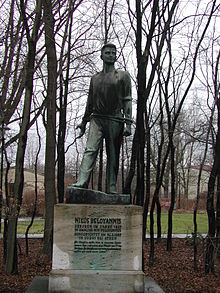- Nikos Beloyannis
-
Nikos Beloyannis (Greek: Νίκος Μπελογιάννης) was a Greek resistance leader and leading cadre of the Greek Communist Party. He was born in Amalias (Peloponnese, Greece) in 1915. He came from a relatively prosperous family and went on to study Law in Athens, but before being able to graduate he was arrested and jailed in the Akronauplia prison (Nauplion) by the Ioannis Metaxas quasi-fascist regime in the 1930s and transferred to the Germans after the Nazi Occupation of the country (1941). He escaped in 1943 and joined the Greek People's Liberation Army (ELAS) in Peloponnese in the side of Aris Velouchiotis. After becoming Political Commissioner of the Democratic Army of Greece (DSE) during the Greek Civil War he was one of the last to leave the country (1949) after its defeat.
In June 1950 Beloyannis returned to Greece in order to re-establish the Athens organization of the Communist Party of Greece (KKE) that had been declared illegal. He was arrested on December 20, 1950 and was taken before a court-martial on charges of violating Compulsory Law 509/1947, which criminalized the Communist Party of Greece (KKE). He was also accused of being a traitor, transmitting information to the Soviet Union.
The Beloyannis trial started in Athens on October 19, 1951. In total, 94 people were accused. One of the three members of the court-martial was Georgios Papadopoulos[1] who later (1967) became the leader of the military dictatorship of 1967-1974.
Beloyannis denied all accusations and stressed the patriotic nature of his actions during the anti-Nazi resistance (1941—1944), the British intervention (1944–1946) and the Greek Civil War (1946–1949). He became globally known as the "Man with the Carnation" and as such he was depicted in a famous Pablo Picasso sketch. Beloyannis made an impassioned defense of the achievements of the resistance and exposed the fact that in the postwar years people who had fought the Nazis were persecuted for their left-wing views, while Nazi collaborators were rewarded with posts in state and government, because of the Cold War atmosphere.
Despite national and international appeals for clemency, in 15-16 of November the court-martial sentenced Beloyannis and eleven of his comrades to death.[2] Four of them were taken from the prison of Kallithea early in the morning of Sunday March 30, 1952 and were executed in the Goudi camp.[3] The sentence to the other co-defendants of Belogiannis was commuted to life imprisonment but by the mid-1960s all were released from prison.
Beloyannis became one of the great heroes of the Greek resistance, and a symbolic victim of the authoritarian postwar establishment. His name was given to the village of Beloiannisz built in Hungary to house the Greek political refugees who lived in exile from the end of the civil war (1949) until the fall of the Papadopoulos junta and the re-establishment of democracy in Greece (1974).
Cultural references
- Pablo Picasso's sketch "Man with the carnation"
- Peter de Francia, "The Execution of Beloyannis", (1953)
- Nikos Tzimas' movie "Anthropos me to garyfallo, O (1980)"
References
- ^ Van Dyck, Karen (1998). Kassandra and the Censors: Greek Poetry Since 1967. Cornell University Press. p. 12. ISBN 0801499933. http://books.google.com/books?id=dnJx1r-85CIC&pg=PA12&ots=VkGxDKP3RR&dq=%22Nikos+Beloyannis%22&sig=XbZ_o9SLbgus4B8xwzlPdr6NPaA.
- ^ rizospastis.gr, October 2001
- ^ 1952: Nikos Beloyannis, the man with the carnation
Categories:- 1915 births
- 1952 deaths
- People from Elis
- Deaths by firearm in Greece
- Greek resistance members
- Communist Party of Greece politicians
- People executed by firing squad
- Greek communists
- Executed Greek people
- People executed by Greece
Wikimedia Foundation. 2010.

